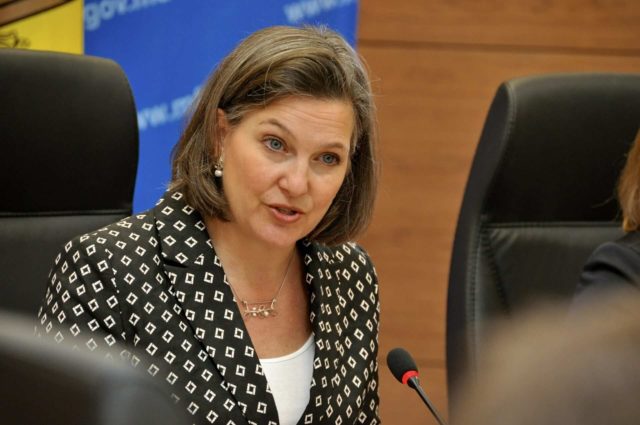
Russia ‘taking incredible losses’ in Ukraine, senior US official says U.S. Assistant Secretary of State Victoria Nuland (U.S. Embassy Moldova/Flickr)
This article was originally published by Radio Free Europe/Radio Liberty and is reprinted with permission.
Russia has been sustaining “incredible” losses since the start of its unprovoked invasion of Ukraine, a senior U.S. State Department official says, putting the figure at more than 10,000 killed since the attack was launched just over a month ago.
“I think that, unfortunately, the Russians have not yet fully learned how tough the Ukrainian military is,” U.S. Under Secretary of State Victoria Nuland said in an interview with Current Time on March 29.
“They are taking incredible losses on the Russian side — you know, by our estimates, more than 10,000 Russian dead,” Nuland said.
Russia has only given official figures about its losses twice since the start of the invasion on February 24, and both were much lower than Western and Ukrainian estimates.
On March 2, the Russian Ministry of Defense put the death toll at 498, and on March 25 it reported that 1,351 servicemen had been killed. Ukrainian officials have given a figure for Russian deaths at more than 17,000.
Casualty figures in the war have proven impossible to independently confirm.
Nuland said the United States welcomed the talks between Russia and Ukraine that were held in Istanbul on March 29, but noted that without a cessation of hostilities, no serious negotiations could take place.
“Until there is a true cease-fire, I don’t think we’re going to have serious talks, but we’ll see,” she said.
Nuland said that Moscow’s decision to reposition its forces, as announced on March 29 by Deputy Prime Minister Aleksandr Fomin, was “a direct result of the fierce resistance that the Ukrainians put up outside of Kyiv and its suburbs and in Chernihiv.”
“However, we know that this is just a repositioning of Russian forces and that they will be back in other parts of Ukraine and that they continue to pound Mariupol and Kherson and other parts of the country,” she said.
“Diplomatic resolutions to conflicts should generally come after an agreed cease-fire, not in the middle of the fighting. And the Russians have been absolutely unwilling to have a full cease-fire so that negotiations can get serious,” Nuland noted, adding that any negotiated end to the conflict should ensure that Ukraine will be able in future to deter a repeat of the aggression.
“Therefore, Ukraine is going to need the kind of security support in its arsenal that it had to use in this conflict, if only to deter Moscow from trying again. So, we will have to continue with our allies and partners to provide strong security support to Ukraine.”
Asked whether the West will respond to Ukrainian President Volodymyr Zelenskiy’s request for air defense systems that are available in countries that used to be a part of Soviet Union, Nuland said that without getting into too many details for reasons of operational security, “I will confirm for you that we are looking for and already providing significant air defense systems for Ukraine.”
She also warned that, unless Russia stops its aggression against Ukraine, it risks even more sanctions from the West.
“As long as this war goes on, we are intent with our allies and partners on increasing the pressure on [Russian President Vladimir] Putin and his government week on week and denying them the money that they need for their war machine,” Nuland said.
But the U.S. diplomat also floated the possibility of a staggered reduction of punitive measures against Russia that would be proportionate with Moscow’s steps toward stopping and eventually reversing its invasion of Ukraine.
“Were we to have a negotiated settlement to this conflict that got Russian forces out of Ukraine, that protected Ukraine’s sovereignty and territorial integrity going forward, that ensured the rebuilding of Ukraine, then sanctions could be rolled back,” Nuland said.
“You could see a scenario where with steps to get Russian forces out of Ukraine, you sequenced the rolling back of sanctions,” she said, but added, “we are a long, long way from there. That’s not where we are right now.”




